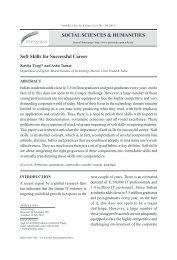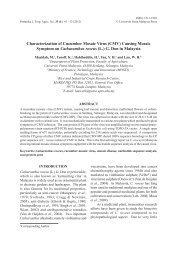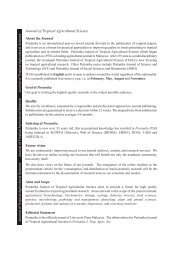JST Vol. 21 (1) Jan. 2013 - Pertanika Journal - Universiti Putra ...
JST Vol. 21 (1) Jan. 2013 - Pertanika Journal - Universiti Putra ...
JST Vol. 21 (1) Jan. 2013 - Pertanika Journal - Universiti Putra ...
Create successful ePaper yourself
Turn your PDF publications into a flip-book with our unique Google optimized e-Paper software.
Guidelines for Authors<br />
Publication policies<br />
<strong>Pertanika</strong> policy prohibits an author from submitting the same manuscript for concurrent consideration by two or more publications.<br />
It prohibits as well publication of any manuscript that has already been published either in whole or substantial part elsewhere.<br />
It also does not permit publication of manuscript that has been published in full in Proceedings. Please refer to <strong>Pertanika</strong>’s<br />
Code of Ethics for full details.<br />
Editorial process<br />
Authors are notified on receipt of a manuscript and upon the editorial decision regarding publication.<br />
Manuscript review: Manuscripts deemed suitable for publication are sent to the Editorial Board members and/or other reviewers.<br />
We encourage authors to suggest the names of possible reviewers. Notification of the editorial decision is usually provided<br />
within to eight to ten weeks from the receipt of manuscript. Publication of solicited manuscripts is not guaranteed. In most<br />
cases, manuscripts are accepted conditionally, pending an author’s revision of the material.<br />
Author approval: Authors are responsible for all statements in articles, including changes made by editors. The liaison author<br />
must be available for consultation with an editor of The <strong>Journal</strong> to answer questions during the editorial process and to approve<br />
the edited copy. Authors receive edited typescript (not galley proofs) for final approval. Changes cannot be made to the copy<br />
after the edited version has been approved.<br />
Manuscript preparation<br />
<strong>Pertanika</strong> accepts submission of mainly four types of manuscripts. Each manuscript is classified as regular or original articles,<br />
short communications, reviews, and proposals for special issues. Articles must be in English and they must be competently<br />
written and argued in clear and concise grammatical English. Acceptable English usage and syntax are expected. Do not use<br />
slang, jargon, or obscure abbreviations or phrasing. Metric measurement is preferred; equivalent English measurement may<br />
be included in parentheses. Always provide the complete form of an acronym/abbreviation the first time it is presented in the<br />
text. Contributors are strongly recommended to have the manuscript checked by a colleague with ample experience in writing<br />
English manuscripts or an English language editor.<br />
Linguistically hopeless manuscripts will be rejected straightaway (e.g., when the language is so poor that one cannot be sure<br />
of what the authors really mean). This process, taken by authors before submission, will greatly facilitate reviewing, and thus<br />
publication if the content is acceptable.<br />
The instructions for authors must be followed. Manuscripts not adhering to the instructions will be returned for revision without<br />
review. Authors should prepare manuscripts according to the guidelines of <strong>Pertanika</strong>.<br />
1. Regular article<br />
Definition: Full-length original empirical investigations, consisting of introduction, materials and methods, results and discussion,<br />
conclusions. Original work must provide references and an explanation on research findings that contain new and significant<br />
findings.<br />
Size: Should not exceed 5000 words or 8-10 printed pages (excluding the abstract, references, tables and/or figures). One<br />
printed page is roughly equivalent to 3 type-written pages.<br />
2. Short communications<br />
Definition: Significant new information to readers of the <strong>Journal</strong> in a short but complete form. It is suitable for the publication of<br />
technical advance, bioinformatics or insightful findings of plant and animal development and function.<br />
Size: Should not exceed 2000 words or 4 printed pages, is intended for rapid publication. They are not intended for publishing<br />
preliminary results or to be a reduced version of Regular Papers or Rapid Papers.<br />
3. Review article<br />
Definition: Critical evaluation of materials about current research that had already been published by organizing, integrating,<br />
and evaluating previously published materials. Re-analyses as meta-analysis and systemic reviews are encouraged. Review<br />
articles should aim to provide systemic overviews, evaluations and interpretations of research in a given field.<br />
Size: Should not exceed 4000 words or 7-8 printed pages.<br />
4. Special issues<br />
Definition: Usually papers from research presented at a conference, seminar, congress or a symposium.<br />
Size: Should not exceed 5000 words or 8-10 printed pages.<br />
5. Others<br />
Definition: Brief reports, case studies, comments, Letters to the Editor, and replies on previously published articles may be<br />
considered.<br />
Size: Should not exceed 2000 words or up to 4 printed pages.





